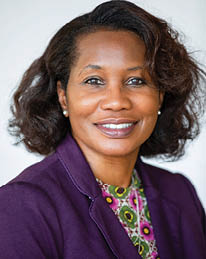Karen Cook-Bell

Department of History and Government
Karen Cook Bell is the Wilson H. Elkins Professor of History with courses and research focused on slavery, African American women’s history, the early Republic and the Civil War and Reconstruction era. Her first book, "Claiming Freedom: Race, Kinship, and Land in Nineteenth Century Georgia" (University of South Carolina Press, 2018), which won the Georgia Board of Regents Excellence in Research Award, interrogates the ways in which kinship, family and community undergirded Black property ownership in the post-Civil War South. She argues that family and community networks allowed Black Americans in Lowcountry Georgia to secure land and property in the post-emancipation South. Black women, in particular, drew on rich spiritual understandings of community and place that long had shaped the contours of their communities and grounded their social networks to become landowners.
Her second book, "Running from Bondage: Enslaved Women and Their Remarkable Fight for Freedom in Revolutionary America" (Cambridge University Press, 2021), engages histories of the Black Atlantic by centering the resistance of freedom-seeking women, many of whom experienced captivity in the Caribbean and the mainland of Revolutionary America, at the forefront of the early abolitionist movement. Throughout her research, she contends that the erasure of enslaved women from discussions of abolitionism, resistance and freedom-seeking, perpetuates a type of historical violence in the archive. "Running from Bondage" complicates the agency of Black women on both the mainland and the Black Atlantic by analyzing the social and political dimensions of freedom seeking. Her study demonstrates that the escape of ordinary Black women, both in the Black Atlantic and mainland, is essential to understanding how women built a culture and a politics of resistance to slavery. "Running From Bondage" was a finalist for the Pauli Murray Book Prize, Honorable Mention for the Letitia Woods Brown Book Prize and received the Afro-American Historical and Genealogical Society’s International Book Award.
Her most recent publication is "Southern Black Women and Their Struggle for Freedom During the Civil War and Reconstruction" published with Cambridge University Press in 2024. This edited collection of essays provides original and innovative perspectives on both traditional and relatively unstudied issues of Black women experiences during the Civil War and Reconstruction period. The essays in this collection, working from varied perspectives, help us to understand the complexity of Black women’s experiences and reveal commonalities and divergence in the post-emancipation experience of women throughout the Black Atlantic.
She is also co-editor of the Broadview Edition of "Twelve Years a Slave," which is under contract with Broadview Press. The commodification of Black women’s bodies as units of capital in the United States and Black Atlantic, and the gendered dimensions of resistance are key elements in the introduction of this edition. Her research interest in Black women’s central role in the long freedom struggle and subversive histories is reflected in her role as general editor of the "Cambridge History of Black Women in the United States"; and editor of a new Cambridge book series titled “Cambridge Studies on Black Women in US History.” The "Cambridge History of Black Women in the United States" is a landmark opportunity to reflect seriously on the state of scholarship on Black women in the United States and the Black Atlantic, as well as reshape our thinking about their impact on American society. This “state of the field” five volume series with ten volume editors from institutions across the United States and Canada will provide the most recent comprehensive analysis of Black women’s history from the colonial period through the present era.
The "Cambridge History of Black Women in the United States" book series focuses on African descended women from colonial settlement to the twenty-first century and include studies on women in the Black Atlantic. The series publishes books that analyze Black women’s experiences with a focus on the lives, labors, war-time experiences and legal battles of Black women in the United States and the diaspora and their self-making practices, which allowed them to navigate slavery and freedom.
Her current book project, "Black Resistance: Family, Gender, and Slave Politics in Denmark Vesey’s Conspiracy," builds on her previous work by interrogating the linkages between family, gender and resistance. The narrative is anchored around Denmark Vesey, whose linkages with the Black Atlantic informed his identity. While Vesey is the central figure of the book, it is his wives and children who are the book’s protagonists. "Black Resistance" studies a broad range of political actors, women and men, who were co-conspirators in the conspiracy, and in doing so challenge the prevailing scholarship on Vesey’s conspiracy regarding the role of women and Black family networks in the conspiracy.
In addition to being a life member of the Association of Black Women Historians, she serves on the editorial board of the "Journal of African American History" and is a member of the Association of African American Life and History Executive Council (Class of 2026). She is managing editor of the "Freedom: A Journal of Research in Africana Studies." She has served on the program committee of the Southern Historical Association, Association for the Study of African American Life and History and served as a member of the American Historical Association Committee on Minority Historians.
Her work has been supported by the American Council of Learned Societies, the National Endowment for the Humanities, the Mellon Foundation, and the American Association of University Women.
